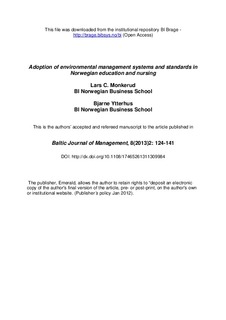Adoption of environmental management systems and standards in Norwegian education and nursing
Journal article, Peer reviewed

View/
Date
2013Metadata
Show full item recordCollections
- Scientific articles [2173]
Original version
10.1108/17465261311309984Abstract
Purpose – The aim of this paper is to explore the driving forces and cost/benefit effects of introducing environmental management systems (EMS) and standards in education and nursing in five of the largest Norwegian cities. The relevant standard is the Eco-Lighthouse program which offers a Norwegian environmental certificate.
Design/methodology/approach – Multivariate analyses of data on motivating factors and perceived costs/benefits from reported EMS adoption from a survey going to executives in 391 schools and 87 nursing homes.
Findings – The study confirms that EMS adoption is driven by resources and capabilities, rather than simply institutional pressure, and that managers in nursing and education perceive reduced costs and other benefits from EMS adoption. The value added of the Eco-Lighthouse certification is ambiguous.
Research limitations/implications – Since the study builds on survey data on perceived effects from EMS adoption, a potential limitation is non-representativeness, although sampled and un-sampled institutions are similar in relevant respects. Moreover, since data are cross-sectional, dynamic effects from EMS adoption is difficult to assess.
Originality/value – The paper corroborates results from previous studies. A novelty in the study is its attempt to control for the effect of rationalization and/or social desirability bias in effects reporting. The likely impact of rationalization/social desirability bias is in general positive but not significant in analyses of cost reductions, although both positive and significant in analyses of other benefit effects.
Description
This is the authors’ accepted and refereed manuscript to the article